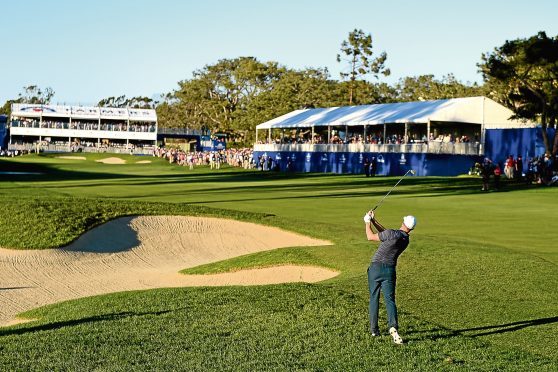Almost a year to the day from Jason Day’s infamous “I’ll play as slow as I want and you’ll like it” press conference, we had the perfect illustration of what he meant.
Day, one of a few notoriously slow players on the PGA Tour, was arguably the chief beneficiary of the bizarre scene at Torrey Pines on Sunday night, but ironically he wasn’t to blame.
Instead it was JB Holmes, in the final group with long-time leader of the Farmers Insurance Open Alex Noren, who was the lightning stick for the most blatant and already notorious examples of slow play in recent tour history.
Holmes needed an eagle on the par five 18th to have any chance of tieing Day, already in the clubhouse at ten-under, and potentially Noren, who needed a birdie to win outright.
The American Ryder Cup player was away as he and the Swede, aiming for a breakthrough win in America after being a prolific winner in Europe, contemplated their second shots.
Noren is not exactly the quickest on the draw on tour, either. But he was clearly the victim here as Holmes took an unconscionable four minutes and 10 seconds to hit his second shot.
Even more unbelievably – maddening and excruciatingly so – his actual decision was to lay up, thereby taking himself out of any play-off. Noren meanwhile was “iced” in the American venacular, waiting a ridiculous length of time for his unbelievably selfish playing partner to decide that fourth place was actually okay.
Noren eventually didn’t make his birdie, and lost the play-off that spilled into yesterday morning to Day. Holmes’ action – or inaction – wasn’t the whole reason for Noren’s failure, but it is certainly in the discussion.
When you’re playing for millions, the excuse goes, sometimes players are justified in taking a little longer. Holmes, one of the serial slowies in the US, himself has said this in the past.
This was the central cachet of Day’s argument last year. A club member taking too much time has no excuse. Professionals are playing for their livelihoods and life-changing money is different.
Brandt Snedeker, one of the quickest players in world golf and an implacable opponent of slow play, demolished that argument, sarcastically thanking Day for the future warning that if they were paired together in a final group that Australian would play slower and slower whatever it meant to the rhythm of his partner’s game, and whatever the rules of the PGA Tour are.
He was pointing out that Day’s intention to play slowly WAS cheating – it was breaking the rules and the direct expense of an opponent, and it was NOT a victimless crime with only spectators’ patience being aggravated.
Sunday was a prime example of what Snedeker meant. Holmes paid little or no heed to Noren’s situation, entirely for his own ends. The fact that he eventually decided to not even attempt to win the tournament showed almost breathtakingly arrogance.
“Where’s Paramor when you need him?” asked one tweet at the time, referencing the avuncular John, the chief referee on the European Tour who does not tolerate half the time that Holmes took, whatever the situation.
Of course the PGA Tour refs don’t have nearly the backbone to impose their own stated regulations. They are craven to the slow players who simply defy the regulations in the knowledge that the tour hierarchy won’t stop them.
Don’t expect any retroactive action upon Holmes, although he entirely deserves it.
But maybe the general outcry for this, with fellow pros lining up to criticise Holmes, will at last force some kind of action from the PGA Tour. In Europe, their slow play regulations are reportedly being applied even more strictly this season.
Hopefully Torrey Pines will end up a tipping point in this issue. Golf can’t afford the selfish curse of slow play much longer if it’s like this.
Tiger and Rory both promise much
On both tours at the weekend, the main attractions didn’t quite get it done.
In Dubai, Rory McIlroy, for the second week in a row, played his worst golf on Sunday. He had a two shot advantage on the back nine against Hiatong Li, but let the promising Chinese player overhaul him down the stretch.
At Torrey, Tiger Woods executed a masterclass in up and downs, hitting just 13 fairways in his competitive comeback. The biggest threat to Tiger’s health was his throat, constantly bellowing “fore!” as another drive careered into the galleries.
Neither should be discouraged, quite the opposite. Rory could have won both tournaments in the UAE having taken a three-month break. It would have been nice to win, but he’s right there.
Tiger got through a weekend swinging lustily – too lustily at times if I was his back doctor – but showed again he has enough smarts and competitive drive to contend in time.
The two will actually meet up at the Genesis Open at Riviera in LA in a couple of weeks, DJ and Jordan Spieth will be there too.
Sounds like it might be a lot of fun.
